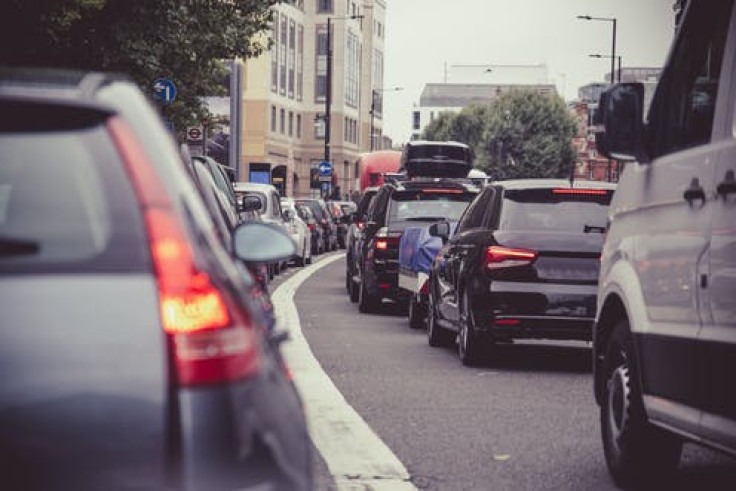Petrol prices are rising, but fuel duty cuts aren't the answer
With fuel poverty rising, few would argue that the current position should be left as it is, but we do not think cutting fuel duty is the answer.

Rising fuel prices are adding pressure on households already struggling to cover basic costs of energy, housing and food. In the face of this there are calls to (further) cut fuel duty, the tax on each litre of diesel and petrol bought in the UK. Current rates are just under £0.53 per litre, or between one third and one quarter of the pump price. Last year this raised the government nearly £26 billion.
With fuel poverty rising, few would argue that the current position should be left as it is, but we do not think cutting fuel duty is the answer.
Cutting fuel duty directly conflicts with efforts to reduce the amount we travel by car, further undermining already weak progress in decarbonising transport and reducing air pollution. Despite recognition in government policy of the need to reflect the rising cost of carbon emissions, the UK government has refused to raise duty in every budget for the past 12 years. This corresponds to a real terms reduction in motoring costs estimated to be £50 billion since 2011.
Calls to cut fuel duty look like the latest manifestation of a too common argument that social justice and environmental concerns are incompatible. This argument is a dangerous mistake.
It now costs more than £100 to fill a typical family car in the UK. Alena Veasey / shutterstock
For a start, cutting fuel duty is perhaps one of the worst targeted income support policies that can be imagined. While any cuts give some help to those who are struggling, they provide most benefit to the well-off. In 2019, for example, the highest income group in the UK drove an average of 4,893 miles per year, more than three times that of the lowest income group. If it is the least well off that the fuel duty cut is aimed at protecting, then the tax system or benefit adjustments would surely be more targeted and effective.
More than this, social justice can – and should – be compatible with tackling environmental problems caused by transport. In our transport system it is far too often difficult for people to manage without access to a car. This means that those without cars can be vulnerable to exclusion from social and economic opportunities, while those with cars are vulnerable to increases in the cost of driving. Effectively tackling social and environmental transport challenges requires concerted effort to remove the barriers to managing without a car wherever that is possible.
Some progress on public transport
The fact that public transport remains unaffordable for many is a persistent barrier. Progress towards providing affordable bus or rail tickets which enable the flexibility people need is glacial or stagnant. Indeed, the Confederation of Passenger Transport estimates that the UK's 12-year fuel duty freeze has resulted in an estimated 200 million bus journeys being lost due to the growing cost gap between the bus and the car.
Capped: Manchester buses. p6foto / shutterstock
A few recent moves offer some hope. In the UK, Greater Manchester has brought buses back under public control and will cap fares. In Germany, travellers can use all public transport for €9 per month for three months this summer, and New Zealand halved public transport prices in response to rising fuel prices. Such moves more effectively target low income groups who tend to be more frequent users, but they are not a panacea as not everyone has good access to public transport, particularly in more rural areas.
Road building is still the priority
Fuel duty cuts perpetuate the long-term dependence on the car and from the perspective of social and environmental justice, we cannot afford to do that. As our experiences during COVID-19 showed, we need to start planning our travel so that we are less exposed to the risks which disproportionately affect the least well off – whether that be contagion or fuel price spikes or extreme climate events. This means taking the right decisions on local accessibility on bike and on foot by prioritising safe, continuous walking and cycling networks, and building a stronger public transport network that works for more people when we are not in a crisis.
Of course, this requires investment at a time when the economy is struggling and facing inflationary pressures. However, the UK continues to invest huge sums of money (£24 billion) in a national road building programme. It is not that the money is not there, it is more a question of what the government chooses to prioritise, as we see from the stark differences with other countries.
If the UK continues to build roads, its addiction to the car will grow, along with its vulnerability to future price spikes. Focusing on the bigger picture of sustainability in transport is essential to reducing car dependence and improving mobility inclusion which is, in turn, critical for long-term social justice.
Current funding from: Economic and Social Research Council (as PI ES/W000547/1; as CoI ES/T000074/1) Engineering and Physical Sciences Research Council (as CoI EP/R035288/1; as CoI EP/S029575/1) Previous funding from several organisations, including EU, RCUKs, Depatrment for Transport, CIHT, Friends of the Earth. Member of Labour Party
Greg Marsden receives funding from the Engineering and Physical Science Research Council (EP/R035288/1 and EP/S032002/1)). He is a non-executive board member of the Zemo partnership and a member of the Greener Transport Council.






